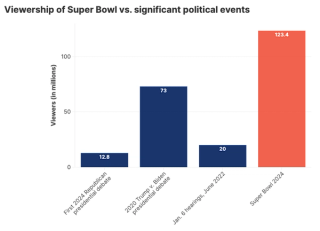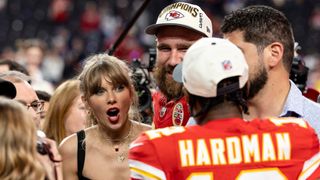The Super Bowl is so much more than just an American football final; it is a made-for-TV spectacle. It is a confluence of American sports, popular culture, and corporate brand power so ginormous and captivating that, as the United States Studies Centre’s Associate Professor David Smith told The Daily Aus podcast, “there is no other time when the entire country is focusing on the same thing, not even elections.”
This year’s Super Bowl broke records, with about 123.4 million tuning into the game on Sunday night. They’re viewership numbers of which political operatives could only dream (remember:roughly 73 million people watched the presidential debate between President Trump and Biden in 2020). And the inevitable draw of such a large captive audience might just explain how popstar Taylor Swift found herself at the centre of a bizarre online conspiracy theory which supposed her relationship with Kansas City NFL player Travis Kelce was part an elaborate ploy to deliver President Biden a well-timed political endorsement ahead of the 2024 presidential election.

Taylor Swift has undeniable influence. According to Vote.org, in March 2023, Swift inspired the registration of more than 35,000 voters after posting a short message on her Instagram encouraging registration. She was nominated Time’s 2023 Person of the Year, has higher approval ratings than the frontrunning candidates for the two major parties, and 272 million followers (on Instagram alone) that transcend the political spectrum.
Ultimately, the Super Bowl saga this year reminds us that in US elections, inspiring voter turnout is key to an election victory. As both frontrunning candidates Trump and Biden face continued doubts over their competencies and their likely 2024 rematch offers little inspiration for new voters– inspiring turnout has never been more high-stakes.
It is then unsurprising that Republicans may be concerned about a similar endorsement of Democrats to what she offered Biden in 2020. Hers is the exact sort of endorsement that the president needs to inject some support for his re-election campaign and improve his chances at what continues to look like a very close 2024 presidential election season.
This article was first published in the weekly 46th newsletter. Subscribe to the newsletter here, to have it delivered straight to your inbox every Wednesday.






